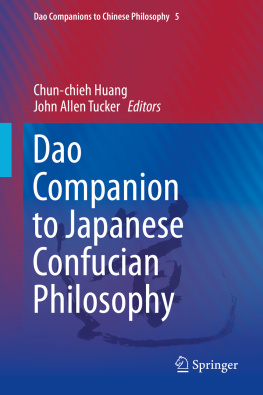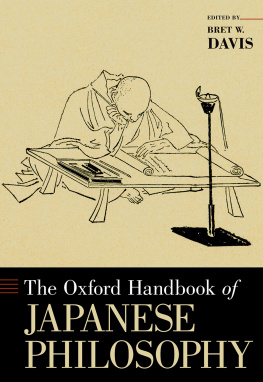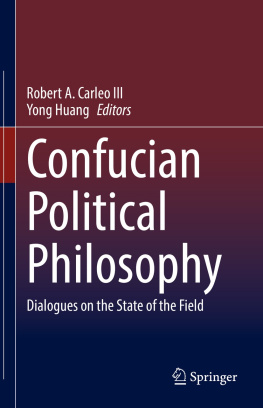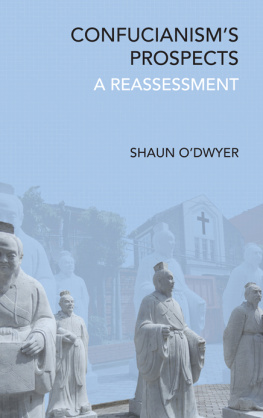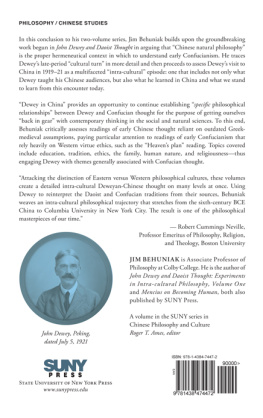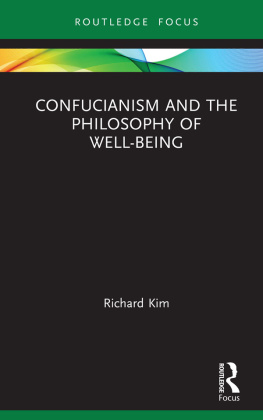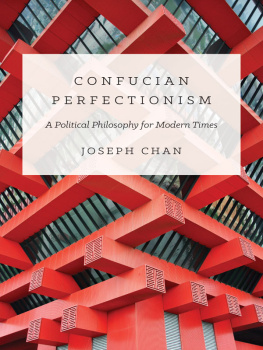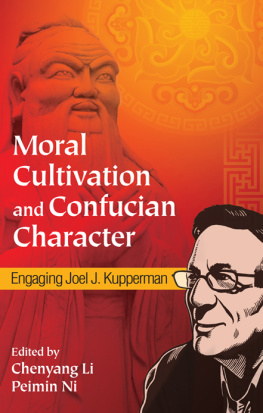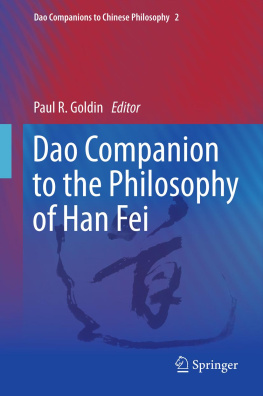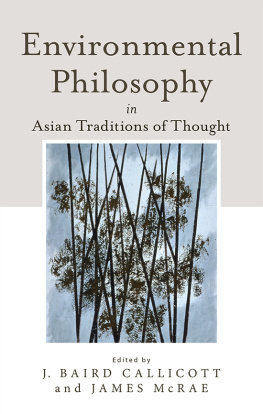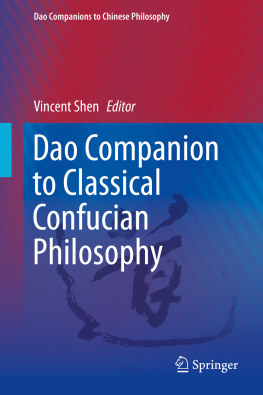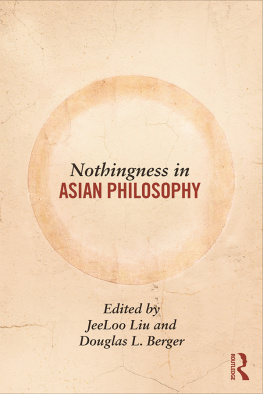1.1 About the Anthology
This volume, part of the Dao Companion to Chinese Philosophy Series edited by H uang Yong , seeks to advance the study of Japanese Confucian philosophy for English language readers. It also advances a tradition in scholarship traceable through at least three previous anthologies: (i) Japanese Thought in the Tokugawa Period 16001868: Methods and Metaphors , edited by Tetsuo Najita and Irwin Scheiner (Najita and Scheiner ). These previous volumes are not exclusively devoted to Confucianism in Japan, although most of their essays deal largely with it in one way or another. The present work boasts essays that invariably focus on Japanese Confucianism, while including themes and topics related to Buddhism, Shint, Nativism, and even A nd Sheki (17031762), one of the most vehement critics of Confucianism in all of East Asia. The earlier anthologies do not describe their contents as philosophy, nor do they necessarily pertain to philosophical thought in every case, but arguably each of them furthers our understandings of Japanese Confucianism and its relevance to philosophy where the latter is understood broadly as an ongoing search for critical insight and self-reflective knowledge, even wisdom ( sophia ), about the nature of the self, society, culture, the polity, spiritual matters, and the cosmos. Methodologically, the earlier anthologies are hybrids combining studies in intellectual history informed by Western theoretical literature along with other studies analyzing philosophically significant writings by Japanese Confucian scholars and their critics. The present volume is also eclectic in methodology.
This anthology differs significantly, however, with an interpretive parameter set in Japanese Thought with its assertion, we should not seek pure philosophical statements, exemplifications of syllogistic reasoning, for this leads one to ask whether there was systematic philosophy in traditional Japan let us say in the manner of Hume or Kant a question destined to receive an uncomplicated negative answer (Najita and Scheiner : 5, 89). Even with its declarative and self-deconstructive propositions, the Tractatus remains one of the great works of philosophy.
Wittgenstein aside, or perhaps because of him, understandings of philosophy and philosophical discourse have gone beyond the Western-centered paradigm that once declared the world other than Europe and areas of European descent to be barren of philosophy. Increasingly students of philosophy are recognizing what Leibniz, Kant, and Hegel noted centuries ago that philosophy is a far grander endeavor than Western philosophy and that one dimension of its grandeur is surely Confucianism (Hegel ). Whether acknowledged minimally as a moral teaching rising to the threshold of ethics, or more fully as comprising metaphysical and ontological speculations, Confucianism rated as philosophy well before the present. However, for reasons to be discussed shortly, during the twentieth century a reaction set in against recognizing Confucianism, including Japanese Confucianism, as philosophy. In China, this became conspicuous in the early twentieth century with the May Fourth Movement; in Japan, it did not occur until the post-World War II period. Yet in the same postwar period, the notion that the world harbors more philosophical wisdom than just that of the West made a comeback, and ironically this was most true in Western thinking about Asian thought, now often considered as philosophical in nature. Since the early 1960s, the Department of Philosophy at the University of Hawaii-Manoa has led this process of rethinking the provenance and scope of philosophy with scholarship published in UH journals such as Philosophy East and West and the Journal of Chinese Philosophy , academic gatherings such as the EastWest Philosophers Conferences, plus numerous UH Press publications monographs and translation-studies exploring Asian and East Asian philosophical thinking. Among Western scholars, Wm. Theodore de Bary at Columbia University has made enormous contributions to the study of Confucianism generally and Japanese Confucianism in particular, as thought, as intellectual history, and in distinctly philosophical terms as well. Since its publication in 1979, Principle and Practicality , a massive volume co-edited by de Bary and Irene Bloom, has incomparably advanced erudite thinking about Japanese Confucianism and its multifaceted expressions of philosophically informed practicality. Essays in Confucianism and Tokugawa Culture edited by Columbia-trained Peter Nosco have expanded understandings of Japanese Confucianism in its ideological, historiographical, and ontological dimensions, as well as in relation to Shint, Buddhism, and some nineteenth-century Meiji thought.
Many other important scholars and their works contributing to the interpretive revolution in understanding philosophy as a global, and certainly Japanese Confucian, activity might be cited here as well. One is David A. Dilworths Philosophy in World Perspective: A Comparative Hermeneutic of the Major Theories published by Yale (Dilworth ). At National Taiwan University, Chun-chieh Huang, dean of the Institute for Advanced Studies in Humanities and Social Sciences has furthered the study of Confucianism as a multifaceted intellectual force in decidedly East Asian contexts, with Japanese developments, philosophical and intellectual, well represented. Within Japan, the University of Tokyo Center for Philosophy (UTCP), founded in 2002, includes researchers studying Japanese culture and intellectual history, as well as traditional East Asian thought, hopefully in an effort, as one of the Japanese Ministry of Education, Culture, Sports, Science and Technologys Centers of Excellence, to foster new understandings of Japanese Confucianism and its philosophical dimensions. Endorsing a broad and inclusive approach to its understanding of philosophy, UTCP similarly emphasizes the importance of understanding Japanese developments within an East Asian and ultimately global context, one aiming at providing for humanity a future conducive to living together ( kysei ).
1.2 Defining Philosophy and Understanding Tetsugaku
Before proceeding, a detailed exposition of what this volume understands by philosophy is in order. Needless to say, it does not subscribe to narrow conceptions that apply to nothing outside of the Western fold. Nor does it recognize philosophy as a discipline that was originally or inherently Western, yet into which non-Western writings are charitably included to build bridges and promote cultural understanding. With Confucianism, there is abundant and compelling evidence that the practice of discussing ethics, politics, the mind, epistemology, the cosmos, and spiritual topics in sustained, self-reflexive, critical dialogues with a conscientious concern for precision in meaning, conceptual use, and logical development occurred with Kongfuzi (551479 BCE) and Mengzi (372289 BCE), about the same time that it did in the West with Socrates (c. 469399 BCE), Plato (424348 BCE), and Aristotle (384322 BCE). Presumably that was why Kant himself called Confucius the Chinese Socrates (Tu and Ikeda : 55). The practice of philosophizing was not, then, something introduced to East Asia; it existed there early on, resulting in, after Catholic missionaries encountered East Asia, the invention, in the Western mind , of Confucius, Mencius, and Confucianism. That invention did not begin or even significantly alter the processes of philosophical development in East Asia; there, what Westerners began calling Confucianism in the West, had long existed, under various names but with a fairly clear and unified identity, as a multifaceted form of learning including discussions of and debates over a range of topics and themes. What this anthology understands by philosophy consists precisely in this sort of ongoing engagement in critical, self-reflective discussions of and speculative theorizing about ethics, epistemology, metaphysics, political theory, and spiritual problems, as well as aesthetics, cosmology, and ontology, with the goal being attainment of a more profound understanding of ourselves, others, the world, and the universe at large. Confucians in East Asia have been doing this for over two millennia, since the time of Confucius.

